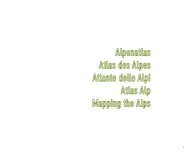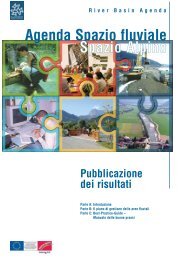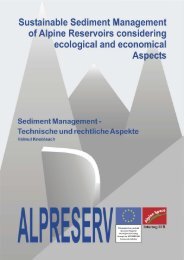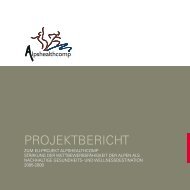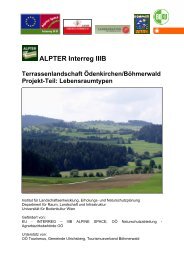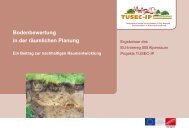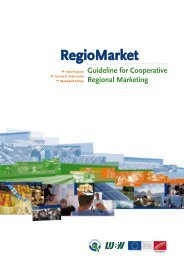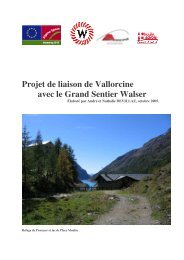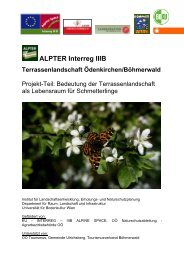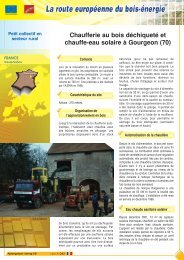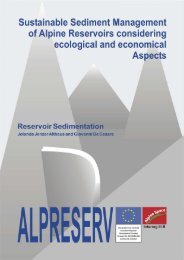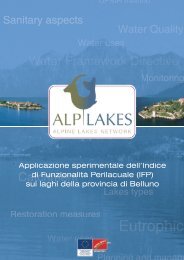1.2 - INTERREG IIIB Alpine Space Programme
1.2 - INTERREG IIIB Alpine Space Programme
1.2 - INTERREG IIIB Alpine Space Programme
Create successful ePaper yourself
Turn your PDF publications into a flip-book with our unique Google optimized e-Paper software.
70<br />
environment and cultural heritage<br />
Lead partner<br />
Bayerisches Staatsministerium<br />
für Umwelt, Gesundheit und<br />
Verbraucherschutz<br />
Other partners<br />
BMLFUW<br />
Umweltbundesamt<br />
Land Kärnten<br />
Land Tirol<br />
Land Niederöstereich<br />
Regione A. FVG<br />
MEDD<br />
Région Rhône Alpes<br />
Univ. Claude Bernard<br />
BfG<br />
LfU<br />
MINAMBIENTE<br />
Provincia A. di Bolzano<br />
RAVA<br />
ARPA Piemonte<br />
Geološki zavod<br />
UIRS<br />
StMWIVT<br />
AWNL<br />
Bundesamt für Umwelt<br />
SLF<br />
Contact person<br />
Erik Settles<br />
Tel +49 (0)89 92143336<br />
Fax +49 (0)89 92142451<br />
erik.settles@stmugv.bayern.de<br />
Duration<br />
03.2006 – 03.2008<br />
Total budget in EUR<br />
3.537.130<br />
ERDF in EUR<br />
1.713.830<br />
Lead partner<br />
Project partner<br />
D<br />
A<br />
A<br />
A<br />
A<br />
A<br />
I<br />
F<br />
F<br />
F<br />
D<br />
D<br />
I<br />
I<br />
I<br />
I<br />
SI<br />
SI<br />
D<br />
FL<br />
CH<br />
CH<br />
3.3<br />
ClimChAlp<br />
Climate Change, Impacts and Adaptation Strategies in the <strong>Alpine</strong> <strong>Space</strong><br />
Assessment of climate change in the Alps and it’s effects on natural hazards, spatial development and economy<br />
as well as development of a transnational flexible response network.<br />
Aim<br />
The Alps as relative densely populated mountains with several<br />
Metropolitan European Growth Areas (MEGAS) in the surrounding<br />
lowlands need a transnational strategy how to react<br />
on all kind of changes caused by climate change. The strategy<br />
consists of an evaluation and improved forecasting of climate<br />
change in the <strong>Alpine</strong> <strong>Space</strong>, improved monitoring systems for<br />
natural hazards with comparable results, an analysis of climate<br />
change effects for key economic sectors e.g. tourism,<br />
a common understanding in the field of spatial planning, development<br />
of sustainable spatial development strategies and<br />
finally common response strategies against natural hazards.<br />
All modules shall be treated in an integrated approach inter<br />
linking the work on each part from the start of the project.<br />
Activities<br />
As a basis, a synopsis of existing information on historical and<br />
recent climate change in the Alps will be generated, climate<br />
models evaluated and corresponding natural hazards compiled.<br />
International expert conferences will serve as a knowledge<br />
platform providing future scenarios and risk potentials.<br />
The results will be used as input to the other activities.<br />
A comparison, assessment and enhancement of present<br />
monitoring techniques for natural hazards will be performed to<br />
improve the prevention and management of specific effects of<br />
climate change on nature in <strong>Alpine</strong> regions.<br />
The prediction and assessment of potential impacts of climate<br />
change on spatial development and key economic sectors<br />
(e.g. tourism, mobility, agriculture, forestry, settlements, industries)<br />
will be based on a general assessment of historical<br />
impacts as well as on current socio-economic trends.<br />
An in-depth analysis of current management tools and practices<br />
of the <strong>Alpine</strong> countries dealing with natural hazards will<br />
be carried out in which regional, national and transnational<br />
administrative methods for preventing and managing natural<br />
hazards will be studied and compared. Well proven methods<br />
identified or innovative approaches created will be implemented<br />
in risk management and networking strategies for new<br />
flexible response systems as instruments of risk prevention<br />
against natural hazards.<br />
Outcomes and results<br />
From all Work Packages of the project a synthesis report for<br />
political decision makers and administration will be derived.<br />
The compiled climate change scenarios for the <strong>Alpine</strong> <strong>Space</strong><br />
can serve as a contribution to IPCC. A catalogue of natural<br />
risks affected by climate change and the forecasts of the future<br />
natural risk potential by climate change scenarios will be<br />
acquired.<br />
In the field of spatial planning public and key economic sectors,<br />
authorities get a solid and reliable basis to assess risk<br />
areas as well as re-evaluate the risk potential of already existing<br />
or planned settlement and economic areas.<br />
By the development of a flexible response network the public<br />
institutions of the <strong>Alpine</strong> <strong>Space</strong> which are responsible to warn<br />
against natural risks or which have to coordinate the reaction<br />
on natural threats get an optimised and transnational working<br />
instrument. This improves the prediction quality and saves the<br />
needed hours to react in time.



